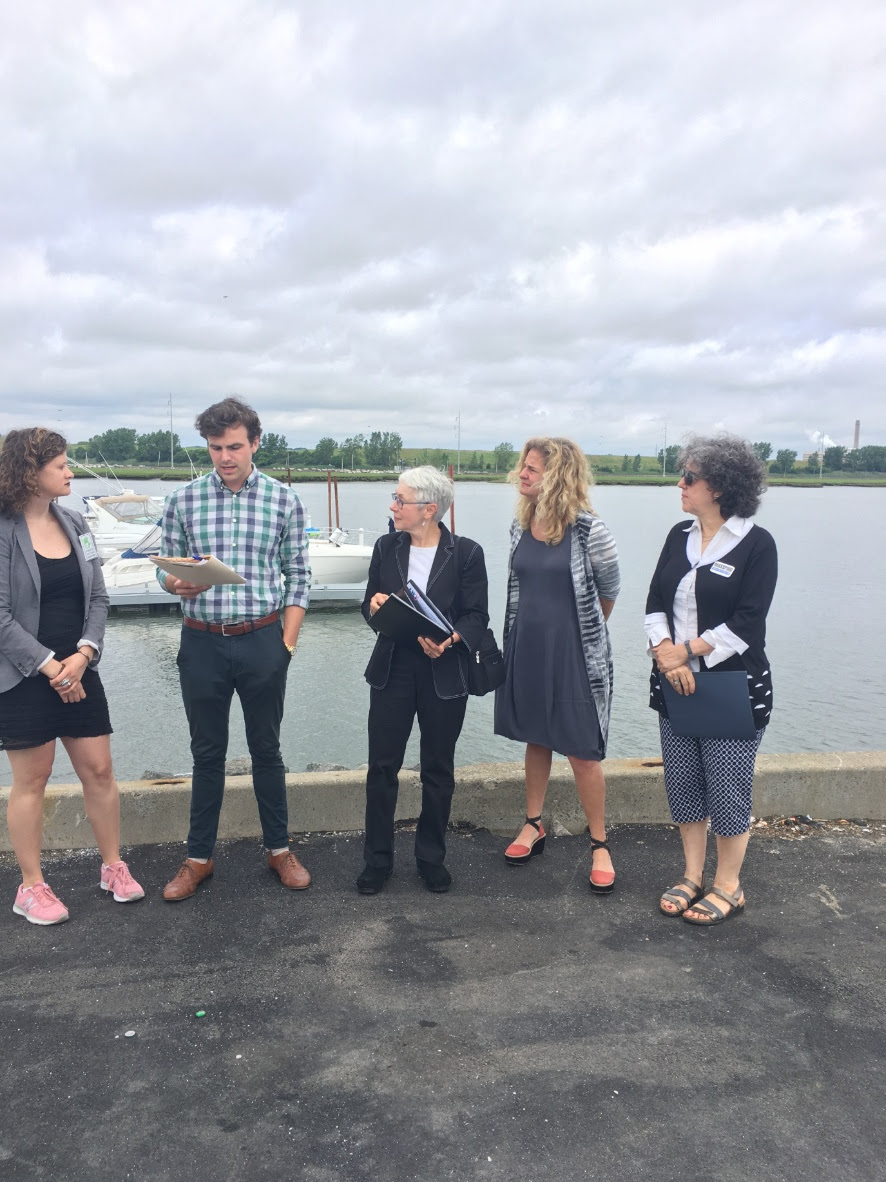Janet Domenitz
Executive Director, MASSPIRG
Executive Director, MASSPIRG

Saugus — With a polluting incinerator as backdrop, a coalition of groups called on Governor Charlie Baker to turn the upcoming 2020-2030 Solid Waste Master Plan into a Zero Waste Master Plan for the Commonwealth. Announcing their campaign, MASSPIRG, Toxics Action Center, and Conservation Law Foundation, illuminated the problems posed by waste and disposal, and offered policy recommendations aimed at reducing waste, all the way to zero.
“As an advocate, an attorney, and a homeowner near the state’s biggest landfill, I am here today with my colleagues to say, we are heading in the wrong direction. We produce too much waste, its disposal is dirty and dangerous, and exporting our trash somewhere else is not the answer,” said Kirstie Pecci, director of Zero Waste at CLF and a resident of Southbridge, MA, who lives just miles from Cassella’s landfill.
Although the Department of Environmental Protection (DEP) set a goal in 2010 to reduce solid waste disposal from 6.55 million tons to 4.55 millions tons per year, in 2017 Massachusetts disposed of over 5.7 million tons of waste. Current waste management practices, which rely heavily on the 20 active landfills and 7 incinerators in MA, are unsustainable and pollute the air, water and land around them..
“The bad news is we work with too many community leaders across the state whose health is harmed by landfills and trash incinerators contaminating the air and water,” said Sofía Owen of Toxics Action. “The good news is we know there is a roadmap to a better place.”
Ann Devlin, of Saugus Action Volunteers for the Environment (SAVE) added, “Living near an incinerator is a constant reminder that we have to move away from disposal and towards reduce and zero waste.”
Every ten years, the DEP is required to issue a Solid Waste Master Plan, which serves as a blueprint for managing waste in MA. It is a comprehensive Plan, and includes recommendations for how we reduce, reuse, recycle, dispose of and otherwise manage all waste generated in MA.
“We have a moment in time, with the drafting of this next Plan, to turn this ship around,” said Janet Domenitz of MASSPIRG. “We have to reckon with the fact that we generate too much waste, our infrastructure supports disposal, and we cannot recycle our way out of the mess we are in. We have to get back to the first word in the mantra: reduce.”
Launa Zimmaro, speaking on behalf of the League of Women Voters of Massachusetts, said “Solutions are right in front of our noses available and already in use in some municipalities with cost savings for those communities and cleaner air and water for the rest of us. We simply need the political will to set the expectation to make them happen. One great example is the town of Acton, where they have reduced their waste by at least 36% by diverting food waste and compostables from disposal along with other waste reduction measures.”
According to a 2018 MASSPIRG report, Trash in America, the waste system in the United States produces 42% of all U.S. greenhouse gas emissions and is a major contributor to global warming. For Massachusetts to make an impact on combating global warming and reducing emissions, changing from disposal to diversion of waste is key.
The goal of zero waste has been set and achieved by cities and countries around the world; and the groups launching this campaign aim to get Massachusetts to be the next state to do so. Zero waste, they outlined, includes the following principles:
Today’s launch marks the beginning of a campaign to involve the public in the process of drafting the next Master Plan, to conduct public education on waste reduction, and to persuade the DEP and Governor Baker to adopt a Zero Waste Master Plan for 2020-2030.

Representatives from the four groups speak in front of the active incinerator in Saugus.
MASSPIRG is a nonprofit, non-partisan public interest advocacy organization working to promoting public health, protecting consumers, ensuring safe and healthy transportation, and safeguarding a responsive government.
Toxics Action Center works side-by-side with communities to prevent or clean up pollution while developing long-term leaders for the broader movement. Learn more at www.toxicsaction.org
Conservation Law Foundation protects New England’s environment for the benefit of all people. We use the law, science and the market to create solutions that preserve our natural resources, build healthy communities, and sustain a vibrant economy.